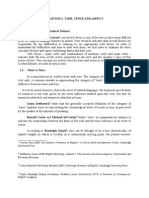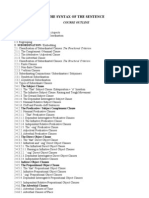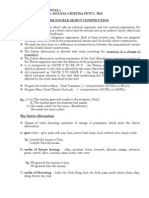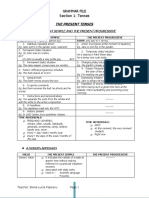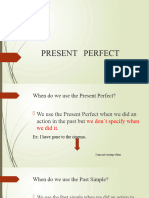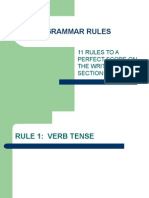The Present Tenses: Grammar File Section 1: Tenses
The Present Tenses: Grammar File Section 1: Tenses
Uploaded by
Andra AndeeCopyright:
Available Formats
The Present Tenses: Grammar File Section 1: Tenses
The Present Tenses: Grammar File Section 1: Tenses
Uploaded by
Andra AndeeOriginal Title
Copyright
Available Formats
Share this document
Did you find this document useful?
Is this content inappropriate?
Copyright:
Available Formats
The Present Tenses: Grammar File Section 1: Tenses
The Present Tenses: Grammar File Section 1: Tenses
Uploaded by
Andra AndeeCopyright:
Available Formats
GRAMMAR FILE
Section 1: Tenses
THE PRESENT TENSES
THE PRESENT SIMPLE AND THE PRESENT PROGRESSIVE
THE PRESENT SIMPLE THE PRESENT PROGRESSIVE
FORM: short inf + s/es (3rd person sg.) FORM: am/ are/ is + vb-ing
1. Habitual, repeated action 1. Action in progress at the moment of speaking
Eg. Jane works in the garden every weekend. Eg. Jane is working in the garden.
2. Permanent state/ situation
2. Temporary state/ situation
Eg. (1) John lives in London,
he is staying in Paris these days.
BUT
he is being very rude today.
(2) John is usually a very polite guy, BUT
3. Permanent state/ situation 3. Changing state/ situation
Eg. The rainy season comes every six months. Eg. The Earth’s climate is getting hotter and hotter.
4. Future: Personal programme (the subject is
4. Future: Official programme/ schedule
the doer of the action)
Eg. The train leaves at 10 pm.
Eg. I’m meeting my parents tomorrow
5. General truth 5. Expressing irritation
Eg. The Earth moves around the sun. Eg. Jane is always taking my things!
6. Repetition of events of limited duration
6. In sports comments
Eg We’re having such a great time here at the
Eg. Beckham receives the ball, he shoots and he
seaside. We’re sunbathing and swimming every
scores.
morning.
7. Instructions and demonstrations
Eg. You separate the yolks from the whites and ---------
add the white to the entire composition.
8. In headlines
---------
Eg. Two airplanes crash into the WTC.
9. Historic present
---------
Eg. In 1922 James Joyce publishes Ulysses.
TIME ADVERBIALS:
FREQUANCY ADVERBS;
TIME ADVERBIALS:
Always, often, usually, habitually,
NOW
generally, sometimes, rarely, seldom,
At this moment, this very moment
hardly ever, never
(instant)
Every + day/ week/ month/ year
Right now
Every+ the days of the week/ months of
the year
A MODERN APPROACH
VALUE THE PRESENT SIMPLE THE PRESENT PROGRESSIVE
Generic Value It indicates the validity of a state at ----------
speech time without making
reference to a particular situation/
moment.
Associated with state verbs
Used in: - Scientific language
- Proverbs
Teacher: Elena-Lucia Popescu Page 1
GRAMMAR FILE
Section 1: Tenses
- Definitions
- Geographical
statements
- Instructions
- Specific game rules
Timeless statements expressing
general/ universal truths
It indicates that a situation is A habitual action extending over
repeated with a certain frequency a limited period of time, generally
during an interval of time. specified
They do not refer to a specific Repetition of events of limited
moment in time; they refer to an duration (does not apply to the
individual or an object about which habit as a whole, but to each and
Habitual Value
the respective property is true at every event which is part of a
Speech Time. habit
The sentences may be completely An idiomatic meaning which
specified, indicating the frequency focuses on its gradual progress;
and the interval during which an + adj/ adv used in the
event takes place comparative
It refers to an event which is
assumed to be simultaneous with
Speech Time
Used in: - Sports commentaries
- Demonstrations
- War reports
Instantaneous
- Exclamations --------
Value
The use of Present Simple renders
the sentence dramatic, insisting on
the total completion of the event
mentioned
Habitual and generic sentences may
receive instantaneous reading
It refers to a plan/ arrangement/
programme made by somebody
It refers to official/ collective future
as the agent of the action
plans/ arrangements that can’t be
always involve human volition,
Future Value altered
which is interpreted as imminent
It may be related to timetables,
since they are fixed
schedule, itineraries
can be contrasted with that of
the Simple Present
Past Value the historic present; a storyteller’s ----------
license which is typical of an oral
narrative style
often alternates with time adverbials
indicating the past
used after verbs of linguistic
communication: tell, say, learn,
hear
it emphasizes the persistence in the
present of the effect of a past
communication
Teacher: Elena-Lucia Popescu Page 2
GRAMMAR FILE
Section 1: Tenses
it is employed when describing an
artist and his work; this feels as if
they were still alive (the artist still
survives through his work)
in newspaper headlines to announce
recent events
it may also refer to imaginary
situations
employed in novels and stories or
stage directions
it indicates temporary/
incomplete activity of limited
duration
Temporary it may refer to activities in
-----------
Value progress at the very moment of
speaking or to a temporary
activity covering a more extended
period of time
used with frequency adverbs:
Emotional always, constantly, continually
------------
Value it suggests irritation/ amused
disparagement
the progressive forms a temporal
frame around another action
expressed by means of a simple
present with a past value.
Temporal
------------- The relationship is that of TIME
Frame Value
INCLUSION: the action denoted
by the simple form takes place
during the action expressed by
the continuous present.
A. THE PRESENT PERFECT SIMPLE
FORM: HAVE/ HAS + PAST PARTICIPLE (the 3rd form of irregular vb-s/ vb- ED for regular vb-s)
USES:
1. To talk about things that took place prior to the present moment (NOW/ ST 1) with an effect
or result in the present.
Eg. (1) I have broken my leg. (the action is recent; my leg is still broken and in plaster)
My leg is in plaster.
Recent action (ET) NOW (ST; RT)
Anteriority
1
ST = Speech Time (NOW)
RT = Reference Time
ET = Event Time
Teacher: Elena-Lucia Popescu Page 3
GRAMMAR FILE
Section 1: Tenses
2. To talk about events that took place in an indefinite past (vs. Past Simple: refers to definite
past events).
Eg. I have been to Paris twice. (the event took place sometime in the past, but it is not
exactly mentioned when)
3. When an event is unusual/ unique in your life (often with a superlative and ever/ never)
Eg. (1) I have never seen anyone who is so rude.
(2) London is the most beautiful city I have ever seen.
4. With the phrases: This is/ It’s/ That’s the first/ second .....time.....
Eg. (1) This is the first time I have been in Africa.
(2) It’s the first time I have ever got so out of control.
5. With report/comment verbs or phrases (guess, imagine, suppose...)
Eg. I guess they have forgotten all about the meeting.
6. In Time Clauses (after when, as soon as, until, before, the moment/ minute etc.) (we
CANNOT USE FUTURE IN A TIME CLAUSE)
Eg. After you have signed the contract, you won’t be able to change your mind.
A MODERN APPROACH
Indefinite Past Theory:
o The Present Perfect locates events somewhere before the moment of speaking,
but without pointing to any particular occasion.
o The time reference of the perfect is indefinite.
Extended Now Theory:
o It analyses the perfect “as a marker of prior events which are nevertheless
included within the overall period of the present, the extended now”
o The perfect tense includes an action or state within certain limits of time; the
limits are those of a period which began in the past and extends up to or into the
present.
o From the point of view of the present the speaker looks back upon some
continuous stretch of the past and within this he places the action/ state. This
period may be:
Momentary: The plane has just landed.
Of considerable extent: The house has been abandoned for years.
Including all past time: “Men have died from time to time and women
have eaten them, but not for love” (W. Shakespeare)
At a pragmatic level:
o The Present Perfect is appropriate in all those uses in which the event described
has relevance for the discourse topic, a fact which can be evaluated entirely only
on the basis of contextual factors.
TIME ADVERBIALS
LATELY
Eg. Have you heard any news from John lately?
RECENTLY (may also be used with Past Simple)
Teacher: Elena-Lucia Popescu Page 4
GRAMMAR FILE
Section 1: Tenses
Eg. I haven’t seen anything interesting recently.
YET
Eg. I haven’t met anyone yet who can sing as beautifully as her.
I have yet to meet anyone who......
ALREADY
Eg I have already done the task.
JUST
Eg. The class has just finished
SINCE..... (referring to the moment when the event occurred)
Eg. (1) I have lived here since I was born.
(2) I have lived here since 1998.
FOR...... (referring to the period of time)
Eg. They have known each other for 20 years.
PRESENT PERFECT SIMPLE vs. PAST SIMPLE
PRESENT PERFECT SIMPLE PAST SIMPLE
Indefinite past event Definite past event
I have done this before. I did this last year.
Present effect/ result No connection with the present
Jane has painted the house. They painted their house a few months ago.
I haven’t eaten this morning. (the morning isn’t
I didn’t eat this morning. (the morning is over)
over)
B. THE PRESENT PERFECT PROGRESSIVE
FORM: HAVE/ HAS + BEEN + vb-ING
USES:
1. To talk about events that took place during a period of time that extends from the past into
the present, including the present.
Eg. I have been living here all my life.
I have been living.....
When I was born (Past Simple) NOW (ST)
TIME ADVERBIALS
SINCE......
FOR.........
Teacher: Elena-Lucia Popescu Page 5
You might also like
- Matthew Reynolds - IntroductionDocument19 pagesMatthew Reynolds - IntroductionMarc PoloNo ratings yet
- Seminar 2 2021Document4 pagesSeminar 2 2021Bianca CiuteaNo ratings yet
- Concepte - Seminar Support Sheet 3 (Subcategorization)Document4 pagesConcepte - Seminar Support Sheet 3 (Subcategorization)Papadius Irina DanielaNo ratings yet
- The Past Tenses: Grammar File Section 1: TensesDocument4 pagesThe Past Tenses: Grammar File Section 1: TensesAndra AndeeNo ratings yet
- Tense EnglishDocument20 pagesTense EnglishIACOBNo ratings yet
- Values of The TensesDocument3 pagesValues of The TensesMihai StroeNo ratings yet
- Fisa de Lucru 1Document2 pagesFisa de Lucru 1Madoșa TimeeaNo ratings yet
- Cloe II Primele Patru Cursuri Si Fisele de Lucru Eu Institutions Oct 2018Document51 pagesCloe II Primele Patru Cursuri Si Fisele de Lucru Eu Institutions Oct 2018Nicoleta EsanuNo ratings yet
- CHAPTER 1 LicentaDocument42 pagesCHAPTER 1 LicentaMara RusuNo ratings yet
- Bachelor's DegreeDocument108 pagesBachelor's DegreeLaura PuscasNo ratings yet
- Linguistic and Multimodal Insights Into The Tourist BrochuresDocument10 pagesLinguistic and Multimodal Insights Into The Tourist BrochuresMegi VisiNo ratings yet
- Translating Humor - P.G. Wodehouse and FrenchDocument13 pagesTranslating Humor - P.G. Wodehouse and FrenchGordon LoganNo ratings yet
- Raymond Hickey - Contrastive Linguistics (Introduction)Document33 pagesRaymond Hickey - Contrastive Linguistics (Introduction)Branislava DilparićNo ratings yet
- Tense Positive/negative/question Usage Signal Words: P: He SpeaksDocument8 pagesTense Positive/negative/question Usage Signal Words: P: He SpeaksSoin MartaNo ratings yet
- Teza LuminitaDocument12 pagesTeza LuminitaElena Cioc100% (1)
- You Know PDFDocument1 pageYou Know PDFDamn You HockNo ratings yet
- Curs PungaDocument175 pagesCurs PungaOana Methers100% (1)
- Azei Coordination Gapping+regroupingDocument10 pagesAzei Coordination Gapping+regroupingCristina MarzaNo ratings yet
- Engleza Romana Lista Verbelor Neregulate PDFDocument7 pagesEngleza Romana Lista Verbelor Neregulate PDFAndreea IlieNo ratings yet
- LEC II B CursuriDocument28 pagesLEC II B CursuriDianaMaria100% (1)
- On The Canadianness of Canadian LiteratureDocument6 pagesOn The Canadianness of Canadian LiteratureAndrei HerineanNo ratings yet
- 10 Irina David and Elena Talmacian Linguistic and Cultural Dimensions of Lexical Borrowings From English Into Romanian PDFDocument8 pages10 Irina David and Elena Talmacian Linguistic and Cultural Dimensions of Lexical Borrowings From English Into Romanian PDFVeronica SendreaNo ratings yet
- Teze de Licenta - Gerunziu Si Participiu IIDocument63 pagesTeze de Licenta - Gerunziu Si Participiu IItima23No ratings yet
- Difficulties of Translating English Collocations Into RomanianDocument3 pagesDifficulties of Translating English Collocations Into RomanianMariana MusteataNo ratings yet
- A Small Matter For Your AttentionDocument2 pagesA Small Matter For Your AttentionCătălin DuceacNo ratings yet
- English Tourism Discourse - RiassuntoDocument23 pagesEnglish Tourism Discourse - Riassuntolaura99bonomiNo ratings yet
- Conceptul de Literatură Universală (Generală) Şi Comparată: Carmen PopescuDocument42 pagesConceptul de Literatură Universală (Generală) Şi Comparată: Carmen PopescuCarmenflori100% (1)
- Valori Semantico-Stilistice Ale Verbului: Limba RomânăDocument7 pagesValori Semantico-Stilistice Ale Verbului: Limba RomânăMaior AdrianNo ratings yet
- Sara Laviosa - Corpus-Based Translation Studies (Chapter 4)Document47 pagesSara Laviosa - Corpus-Based Translation Studies (Chapter 4)batman197006No ratings yet
- Grammar Perspective, EUB, 2006. Approach, EUB, 2003. Reference & Practice Book With Answers, Longman, 2003Document74 pagesGrammar Perspective, EUB, 2006. Approach, EUB, 2003. Reference & Practice Book With Answers, Longman, 2003Nicoleta PotoracNo ratings yet
- Seminars 3&4 - That Complements, SOT, SubjunctivesDocument6 pagesSeminars 3&4 - That Complements, SOT, SubjunctivesAndrei BobeicăNo ratings yet
- Gapol - Ro 08 The Tenses The Sequence of TensesDocument6 pagesGapol - Ro 08 The Tenses The Sequence of TensesAntonio ValentinNo ratings yet
- GRANFELDT L'acquisition Des Catégories FonctionnellesDocument279 pagesGRANFELDT L'acquisition Des Catégories FonctionnellesMichèle Michèle100% (1)
- Gilles LipovetskyDocument4 pagesGilles LipovetskyAnonymous j5B2CZNo ratings yet
- Economy Terms English - Romanian GlossaryDocument4 pagesEconomy Terms English - Romanian GlossaryStrugacAlisaMariaNo ratings yet
- Caiet PracticaDocument120 pagesCaiet PracticaSimona JianuNo ratings yet
- Contrastive Analysis of Gerund in English, Romanian and FrenchDocument80 pagesContrastive Analysis of Gerund in English, Romanian and Frenchinelus_2008100% (3)
- Sample Mid Course TestDocument4 pagesSample Mid Course TestHương ThảoNo ratings yet
- Lec Iib Sintaxa 1 CursDocument8 pagesLec Iib Sintaxa 1 CursIngrid BerezovschiNo ratings yet
- Note de Curs. NominaDocument145 pagesNote de Curs. NominaMaria Andreea100% (1)
- Sintaxa FrazeiDocument8 pagesSintaxa FrazeiLorena Andreea0% (1)
- Curs 5 Infinitive Complements PDFDocument9 pagesCurs 5 Infinitive Complements PDFgensai kNo ratings yet
- CP de Limba Engleza - Gabriela DimaDocument46 pagesCP de Limba Engleza - Gabriela DimaGabriel BotezatuNo ratings yet
- Complementation IntregDocument143 pagesComplementation IntregAdrian AmarieiNo ratings yet
- Pragmatica - ExercitiiDocument22 pagesPragmatica - ExercitiiClaudiu Mihai ChelariuNo ratings yet
- Textual Practice (Series 5)Document24 pagesTextual Practice (Series 5)Delia-Elena GavrilNo ratings yet
- Siloni Noun Phrases and NominalizationsDocument227 pagesSiloni Noun Phrases and NominalizationsRobert VoogdgeertNo ratings yet
- Lec II B Sintaxa I Curs 3 4 Primavara 2013Document28 pagesLec II B Sintaxa I Curs 3 4 Primavara 2013Gina AuroraNo ratings yet
- Lec - PragmaticaDocument27 pagesLec - PragmaticaAdrian Savastita100% (1)
- Modalization: Aspects of Modality and Modal VerbsDocument60 pagesModalization: Aspects of Modality and Modal VerbsStoica Alexandra100% (1)
- Teoria Si Practica Traducerii - Curs de LectiiDocument27 pagesTeoria Si Practica Traducerii - Curs de LectiiAnonymous tLZL6QNo ratings yet
- Proiect DidacticDocument4 pagesProiect DidacticCrăciun AlinaNo ratings yet
- Get Started With English Language TeachingDocument111 pagesGet Started With English Language TeachingMarina EllaNo ratings yet
- PHRASAL VERB Lucrare DisertatieDocument40 pagesPHRASAL VERB Lucrare DisertatieDuca GeorgeNo ratings yet
- The TensesDocument12 pagesThe TensesArvind KumarNo ratings yet
- Prepositions of Time For During WhileDocument3 pagesPrepositions of Time For During WhileBrian HartleyNo ratings yet
- ANG3153 - Week 2 - Tenses 1Document19 pagesANG3153 - Week 2 - Tenses 1Esmeralda BCKNo ratings yet
- TensesDocument7 pagesTensesredchillipaperNo ratings yet
- Kelas XI Explanation TextDocument8 pagesKelas XI Explanation TextLala YayaNo ratings yet
- Seminar 3 Try To Answer These QuestionsDocument3 pagesSeminar 3 Try To Answer These QuestionsAndra AndeeNo ratings yet
- The Present Tenses: Grammar File Section 1: TensesDocument5 pagesThe Present Tenses: Grammar File Section 1: TensesAndra AndeeNo ratings yet
- Form of The PassiveDocument4 pagesForm of The PassiveAndra AndeeNo ratings yet
- The Passive Practice: Give The Passive Counterparts of The Following SentencesDocument1 pageThe Passive Practice: Give The Passive Counterparts of The Following SentencesAndra AndeeNo ratings yet
- A Study of Effectiveness of A Programme Developed For Marathi Medium Student Std. Vith To Improve Use 'Tenses' in English GrammerDocument36 pagesA Study of Effectiveness of A Programme Developed For Marathi Medium Student Std. Vith To Improve Use 'Tenses' in English GrammerSohel BangiNo ratings yet
- Expressing FutureDocument4 pagesExpressing FutureBettyNo ratings yet
- Writing Workshop 2018Document105 pagesWriting Workshop 2018asmirazrizaNo ratings yet
- Present Perfect 3Document21 pagesPresent Perfect 3Antonia Sofia CiappaNo ratings yet
- SG 05 Combo Text 2020 Lo-ResDocument144 pagesSG 05 Combo Text 2020 Lo-ResAbdulrahmanNo ratings yet
- L - 16, Expressing Future TimeDocument19 pagesL - 16, Expressing Future Timeapi-233604231No ratings yet
- ENG - B1.1.0204G Present Simple Vs Present Continuous PDFDocument24 pagesENG - B1.1.0204G Present Simple Vs Present Continuous PDFankira78100% (1)
- FP015 CP CO Eng v1r0CataRuthDocument8 pagesFP015 CP CO Eng v1r0CataRuthRuth FigueroaNo ratings yet
- English Page - Simple PastDocument6 pagesEnglish Page - Simple PastidahashimNo ratings yet
- Grammar Rules: 11 Rules To A Perfect Score On The Writing Section of The SatDocument109 pagesGrammar Rules: 11 Rules To A Perfect Score On The Writing Section of The SatVinay ChalluruNo ratings yet
- Language Test For 2bac. 2016Document3 pagesLanguage Test For 2bac. 2016Mubarak Abdessalami100% (4)
- PT Enlish6 Q4 FinalDocument6 pagesPT Enlish6 Q4 Finalmariantriguero1229No ratings yet
- HS3152 .Notes Unit 3Document89 pagesHS3152 .Notes Unit 3sramalingam28No ratings yet
- The Basics of Morphology 1Document31 pagesThe Basics of Morphology 1Queen SaraNo ratings yet
- Fotopala Verb Tense Formulas 2017 PDFDocument1 pageFotopala Verb Tense Formulas 2017 PDFfennperNo ratings yet
- DLL - English 5 - Q1 - W3Document5 pagesDLL - English 5 - Q1 - W3LUCELE CORDERONo ratings yet
- NullDocument6 pagesNullapi-27180477No ratings yet
- Lesson 49-60Document178 pagesLesson 49-60Abbygail AlbaisNo ratings yet
- Rhea - Samuel A. - Brief Grammar and Vocabulary of The Hakkari - 1869Document39 pagesRhea - Samuel A. - Brief Grammar and Vocabulary of The Hakkari - 1869Anonymous qkhwe0nUN1No ratings yet
- Representing Speech and ThoughtDocument30 pagesRepresenting Speech and ThoughtReLan James RosaldoNo ratings yet
- Curriculum BTech EEEDocument168 pagesCurriculum BTech EEEAnonymous ETBwIduGiNo ratings yet
- English Grammar (Tenses)Document16 pagesEnglish Grammar (Tenses)yashudipak632010No ratings yet
- Present Tenses ReviewDocument6 pagesPresent Tenses ReviewRamona DinuNo ratings yet
- Grammar ExplanationDocument66 pagesGrammar ExplanationSurya Pratama100% (1)
- Mixed Conditionals ExerciseDocument4 pagesMixed Conditionals ExerciseDhe LandichoNo ratings yet
- Applied Grammar and UsageDocument28 pagesApplied Grammar and UsageGrace Kunchakara100% (2)
- Present Perfect TenseDocument9 pagesPresent Perfect TenseKhoerul AnwarNo ratings yet
- English Tenses Made Easy1Document3 pagesEnglish Tenses Made Easy1shannia rNo ratings yet
- The Present Perfect TenseDocument3 pagesThe Present Perfect TenseIsabellatrufasuNo ratings yet
- Learn English Is FunDocument71 pagesLearn English Is Funika_nikan100% (1)














